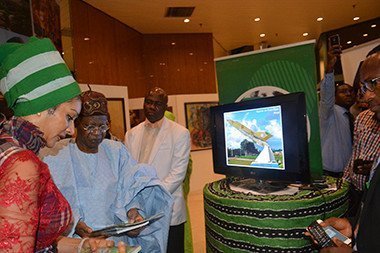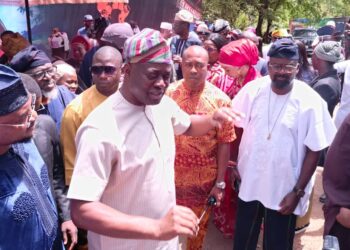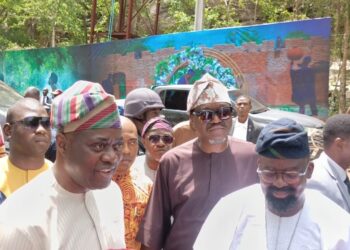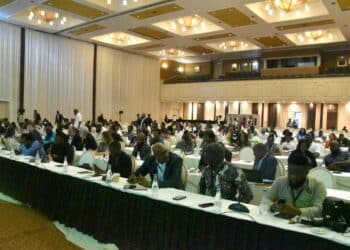HOPE has again risen for tourism in Nigeria, as various promises were made by the government while stakeholders in the industry also recommended ways to ways to reposition and develop the globally adjudged money spinning sector in the country, during the 2016 Nigeria Culture and Tourism Summit, organised by the Ministry of Information and Culture.
President Muhammodu Buhari, taking the lead in his address, described tourism as a resource of development and means of providing an additional opportunity for a non-industrialised country like Nigeria, to diversify its economic base for the betterment of all.

The President, represented by the Minister of Industry, Trade & Investment, Dr. Okechukwu Enelamah said: “the road for us as a nation to achieve our set objectives of diversifying our economic base will depend partly upon the quality of design and implementation of tourism policies; we must develop appropriate policies and the right attitudes towards achieving the desired goals.
“We are aware that the development of the tourism sector all over the world is largely private-sector-drive. However, as evident in the 2016 budget, this administration will continue to provide the required enabling environment for arts, culture and tourism to thrive and develop, through the massive upgrading of infrastructure and the provision of security. We will continue to encourage public and private sector participation and partnership in all the desired areas, including transportation, beach and resort development as well as tour operations, hotel and hospitality development.”
President Buhari then charged the Ministry of Information and Culture to effectively liaise with other relevant ministries and agenvies to work out appropriate programmes, including actions and measures that would help in fighting the scourge of these social vices brought by the collapse of our value systems.
The Minister of Information and Culture, Alhaji Lai Mohammed, during the Gala Night of the summit, held at the Congress Hall of Trascorp Hilton Hotel, Abuja, boosted the moral of the stakeholders present as he promised the readiness of the present administration to make culture and tourism the bedrock of the Nigeria’s economy.
His words: “In this summit, we have brought together all the people who can make the culture and tourism industry work, stakeholders from both the public and private sectors who are well-grounded in the industry.
“What we want to do is to let the world know that the culture and tourism portfolio is as attractive as Ministry of Petroleum Resources.’’
Lai Mohammed advised members of staff of the ministry and its agencies not to feel rejected given the current government establishments’ structure.

He gave assurance that the sector would be made money spinner for government and the pride of among government establishments for public and civil servants.
The minister opined that Nigeria has a vibrant culture sector, which according to him, is second to none in the world, saying, “Moreover, our rich cultural heritage is ‘soft power’ to confidently take on the world. Therefore, to deploy this ‘soft power’ to effectively promote international cultural diplomacy, we have to leverage the potentials in our culture to help drive our tourism sector so as to obtain our share of the global tourism benefits that would help resuscitate and redefine our tourism industry for sustainable economic development.”
Lai Mohammed, however, described the challenges before the country as to work out long term strategies to develop the nation’s culture and tourism sectors and move them into the mainstream of the economy, “while not failing to design ways and means of plucking some low-hanging ‘fruits’ along the way.”
Earlier in a welcome address, Ayotunde Adesugba, the Permanent Secretary of the ministry said that the gathering would design ways culture and tourism would impact on other sectors.
“The summit will highlight the critical sectors of culture and tourism with a view to create job opportunities and improve other sectors like agriculture, transport and manufacturing.
“Culture and tourism have become dominant sectors in many countries around the world and the drivers of their economies.
“Nigeria must take the advantages of its rich, diverse and abundant culture and tourism potentials,’’ she said.
Adesugba thanked participants and delegates to the conference and urged them to contribute their best to make culture and tourism the bedrocks of the Nigerian economy.
Stakeholders calls for change of Ministry of Information and Culture

Tourism stakeholders at the summit also called for the change of name of the Ministry of Information and Culture to Ministry of Information, Culture and Tourism.
The stakeholders while responding to various papers delivered at the summit described culture as a unit of tourism, arguing that tourism is big and wide enough that it should not even be subservient to any other ministry.
“If the present administration cannot give tourism a separate ministry, it should rename the Ministry of Information and Culture to reflect tourism, thereby making it Ministry of Information, Culture and Tourism, to harmonise it with what operates in other tourism-promoting countries,” the stakeholders prayed.
Expert Gives Tips on Tourism Development in Nigeria, Adopts Sally Mbanefo’s Tourism Bank Initiative
Tourism stakeholders and experts made the recommendations during a plenary session in the summit on Thursday – the second day of the summit, with the establishment of the Tourism Bank initiative of the Director-General, Nigerian Tourism Development Corporation (NTDC), Mrs Sally Mbanefo, being adopted.
The Tourism Bank, according to Mrs Mbanefo, will facilitate access to funds by investors “instead of waiting for budgeted monies from the ministry to carry out projects.”
Mr Bertram Azuwike, the Director of Macro-Economy and Statistics Department of National Bureau of Statistic (NBS) said there was need to develop a data bank for the culture and tourism industry.
He added that “culture and tourism data bank will help to show the significance of tourism’s economic contribution to national income.
“This will give the industry greater respect from both government officials and the public.
“It will enable policy makers to measure the impact of past policies and projects, thus helping them to know the extent to which the set objectives were attained.
“Culture and tourism will not go far without a data bank,’’ Azuwike stressed.
The Chairman of the Tourism plenary session and President of Federation of Tourism Association of Nigeria (FTAN), Chief Tomi Akingbogun, while reading the recommendation of the committee said it was through the private sector that government could make money.

The committee recommended the establishment of a Tourism Bank to facilitate access to funds by investors instead of waiting for budgeted monies from the ministry to carry out projects, adding that if the proper things were not put in place to make business excel, culture and tourism business would not attain its intended position and benefits.
“Tourism has impact on employment and the economy; we have many tourism potential and if we cannot tap them, we will go nowhere.
“If 20 states in the country are doing well in tourism, it will have multiplier effects on the economy; the Calabar Carnival had effects on hotels, farmers and
street cleaners.
“If the carnival is done three times in a month and in 20 states of the federation in a year; imagine the number of people it will empower.”
The committee also said that the private sector was interested in driving the economy and to make it work.
He, however, added that it was regrettable that it took a long time for tourism investors to get approval from government, stressing that “that is why we keep talking yearly without progress.’’
The committee further said that taxation on hospitality industry, including the recent tariff increase by power sector investors was killing the industry.
“Hotels are shutting down in Abuja; Transcorp Hilton recently complained that its electricity tariff increased by N25 million monthly.
“With such increment and other exorbitant levies, how do you expect them and other hotels to expand.
“There is need to develop tourism clusters, reactivate the Presidential Committee on Tourism and implement the Nigerian Tourism Map.”0
The committee also recommended effective leadership at the tourism parastatals, tourism vouchers and the inclusion of domestic tourism in education curriculum of schools across the country.
Another expert, Prof. Sule Bello, said: “Culture is about what we learn and how we put it into practice.”
Bello said museums in the country were being taken for granted, adding that “museums are the source of our history and ways of life.’’
He said that the Ministry of Information and Culture should extend hands of cooperation to countries like Ghana, Kenya, The Gambia and others.
“Nigerian arts and painting should be placed at strategic areas at the National Assembly, the presidential villa and entry points of the Federal Capital Territory.
“Government should have its museums in other countries of the world; this will go a long way to portray the country’s history to others.
“Cultural history of the country should be taught from primary school to university level across the country,’’ he said.
Speaking in same vein, another expert, Mr Wale Akinboboye, observed that “when the Europeans came to Africa, they were fascinated by our rich cultural heritage and they referred to us as ‘Cultural People’’.
“Therefore, if we want to drive culture and tourism, we must do it through the way we live.”
Malam Sherif Abdulhamid, another tourism expert, said that the function of tourism was to attract people and gain benefits.
He stressed the need for government to identify potential linkages in the tourism sector and to harness them toward earning for the development of the nation.









